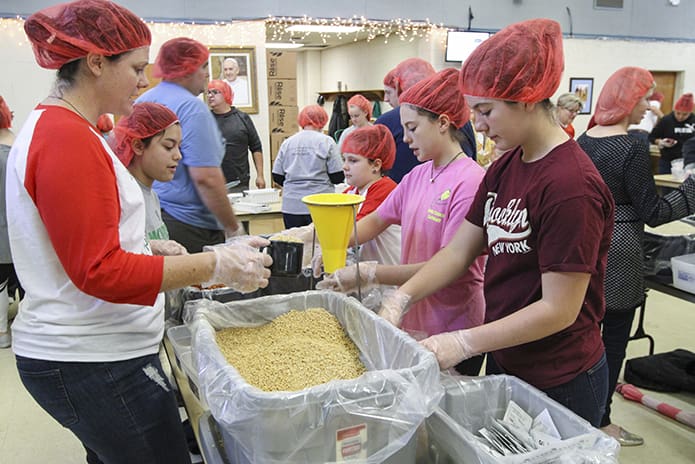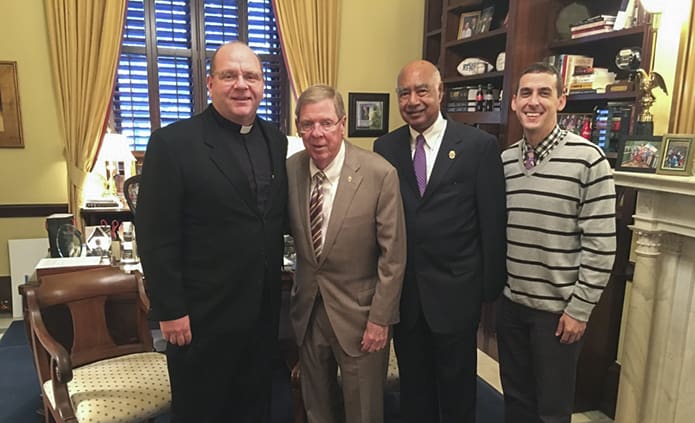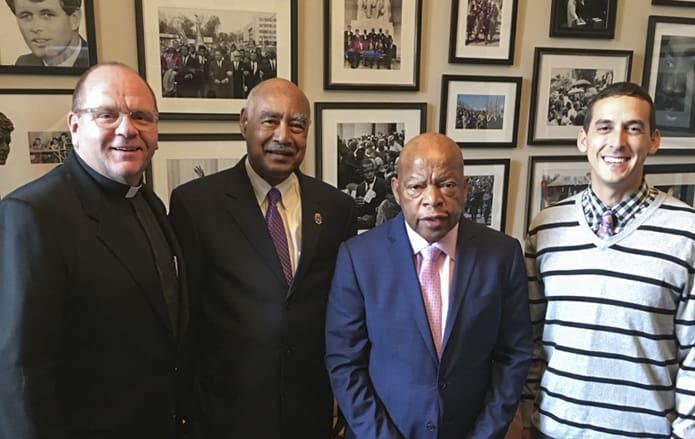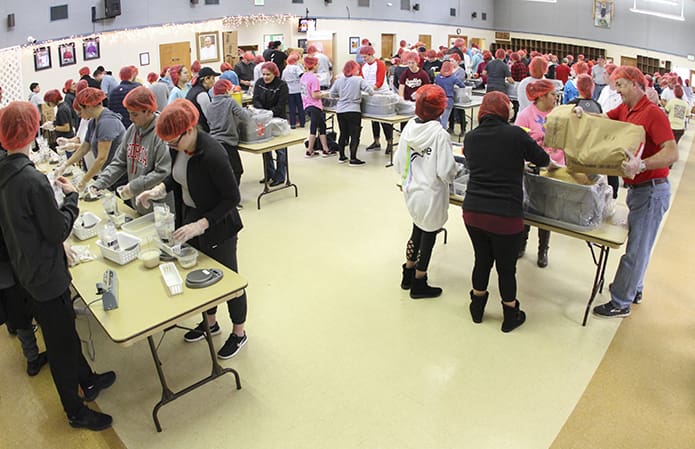This is the fifth year in a row Shannon Gaines, foreground left, and her family have participated in the Catholic Relief Services’ Helping Hands event at Holy Trinity Church, Peachtree City. Gaines was joined by (counterclockwise, from foreground right) her daughters Ashlyn, 15, Addison, 12, and Eliana, 8, and her niece Dalayla Giles, 16. Photo By Michael Alexander
Atlanta
Catholics involved at home in the global work of CRS
By NICHOLE GOLDEN, Staff Writer | Published December 20, 2018
ATLANTA—The year 2018 marks a special milestone for Catholic Relief Services—its 75th anniversary.
In 1943, the Catholic bishops of the United States established CRS to help war-torn Europe and its refugees recover. During World War II, CRS’ work focused on the resettlement of war refugees in Europe. The mission continues today, using the gospel of Jesus Christ as its mandate.
The agency provides assistance without regard to race, creed or nationality. CRS is the official overseas relief and development agency of the U.S. Conference of Catholic Bishops.
Gerry Carolan, a parishioner of Holy Trinity Church, Peachtree City, has hosted multiple CRS Helping Hands meal-packing events at her parish. She will serve on the CRS national board of directors beginning in 2019.
“I just always liked their mission,” said Carolan.
She moved to the Atlanta area from Seattle, Washington in 1993 because of her job with Delta Air Lines.
Carolan has organized six of the Helping Hands meal-packing events, the most recent on Dec. 15. The parish packs 100,000 meals yearly for residents of Burkina Faso, a West African nation plagued by military coups and drought.
Carolan’s volunteers include those who help unload supplies that arrive by truck ahead of the event. Both young and old, those with mobility challenges and entire families come later to package meals. She has a wheelchair-bound man on oxygen who assists every year, and has had helpers as young as 3 years old.
“People want to teach their kids,” she said about the hands-on nature of the day. “It’s such an incredible event.”
Holy Trinity has three shifts for the packing of soy protein, rice and dehydrated vegetables.
It’s an enjoyable day with giving at the heart and is about “building community,” said Carolan.
“It’s really fun, we play music. Our Hispanic community comes out in a big way,” she added.
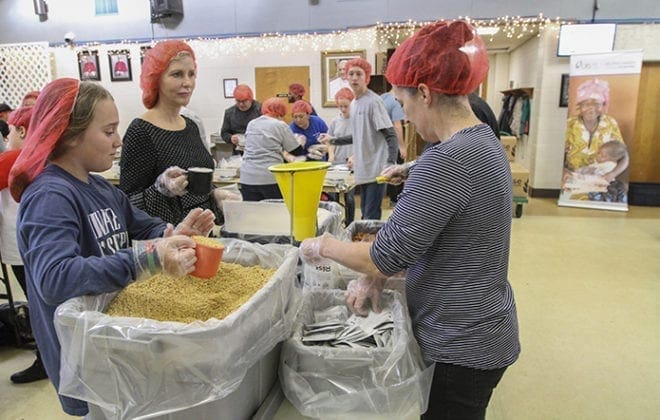
The four-member team (clockwise, from foreground right) of Alyssa Mason, her 11-year-old daughter Sarah, Michele Davis and Wendy Binfield fill meal bags during the Dec. 15 Catholic Relief Services’ Helping Hands event at Holy Trinity Church, Peachtree City. Photo By Michael Alexander
Helping Hands is an opportunity for people to meet fellow parishioners, often for the first time.
The parish raises money for the meals, purchased in bulk from the partner organization Rise Against Hunger. The $50,000 raised funds not only the food, but also to help the poor learn ways of making a living.
“Half the money goes to development programs in Burkina Faso,” said Carolan.
People there can learn skills to make a product, to raise animals and better agricultural practices.
Carolan has found the Helping Hands events also build awareness of CRS in her area. Since Holy Trinity first began the meal-packing endeavor, general donations from Fayette County residents to CRS have increased. Many non-Catholics also join the day.
In remote, impoverished places across the world, most people already know what CRS means.
“They know something good is going to happen,” said Carolan about the name recognition.
She believes most parishes can easily replicate the project.
“I reassure them it’s doable,” she said.
Father John Murphy, pastor of Holy Trinity, in encouraging support of the event, reminded parishioners that the packing of the food on that day is an act of praying.
Carolan traveled to Burkina Faso, half of which is desert terrain, after her second year of organizing Helping Hands
It was gratifying to see the boxes of food with Holy Trinity labeling while in country.
“One of the things that attracted me to CRS is how effective and efficient they are,” said Carolan. “CRS is all about protecting people’s dignity.”
Whether it’s a master farmer’s program or teaching a skill, the agency’s investment is at “that top level.”
They have distribution of food and administration of programs down to a science, but are also innovative, she noted.
Making an impact
Carmen Graciaa, faith formation director at Immaculate Heart of Mary School in Atlanta, also takes up the work of supporting Catholic Relief Services.
Graciaa has put together CRS Ethical Trade sales for the school community for more than a decade. She also has hosted the trade sales at her parish, Holy Cross.
The students become involved in taking inventory and shop keeping at the sales, which feature handmade items, coffee and chocolate.
“They have a role to play too. You have to account for the items,” she said.
While items available make nice gifts, the sales help artisans around the world to make a living wage and meet basic needs.
“We try to educate them” said Graciaa about the youth helping. “I do think it makes an impact.”
Catholic Relief Services and its partner Serrv have worked together since 1995 to offer quality, ethically traded handcrafts and food made by struggling farmers and artisans. With every purchase, Serrv makes a contribution to the CRS Fair Trade Fund. When purchasing ethical trade products, shoppers stand with the poor and vulnerable.
Graciaa orders sale items from Serrv International, which warehouses them.
“It’s basically a consignment sale,” she said about the concept.
The gift items are of exceptional quality with many hours obviously spent on their creation, said Graciaa.
“A lot of it is done through co-ops,” she explained. “It’s a beautiful circle of giving. I’ve enjoyed doing it.”
For the IHM community, it seemed natural to become involved in fair or ethical trade sales.
“We were already involved with Operation Rice Bowl,” said Graciaa, who is in her 21st year at the school.
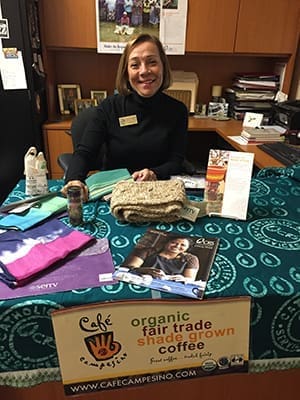
Carmen Graciaa, the director of faith formation at Immaculate Heart of Mary School, Atlanta, has hosted a number of Catholic Relief Services Ethical Trade Sales at the parish school over the years.
Rice Bowl is the annual Lenten campaign of CRS that encourages fasting, donations and learning about the poor worldwide.
Graciaa tries to hold at least two sales a year and encourage others to host the events.
“I think it’s a great thing for a women’s group—anybody who is interested in helping others,” she said.
The IHM school and parish community will also take up the work of meal-packing this March in continuing celebration of its 60th anniversary.
In the 1950s, CRS began to look to other parts of the world, seeking out those who could benefit from assistance. For the next two decades, CRS expanded operations and opened offices in Africa, Asia, the Middle East and Latin America.
During this expansion, CRS built on its tradition of providing relief in emergencies and began to seek ways to help the developing world break the cycle of poverty through community-based, sustainable initiatives. In addition to agricultural initiatives, programs include community banks, health, education and clean water projects.
Augusto Michael Trujillo is the relationship manager for CRS, Southeast Region, in Atlanta.
Trujillo said CRS has three initiatives of important emphasis currently.
The initiatives include the Parish Ambassador Corps, Catholic Confront Global Poverty and CRS Ethical Trade.
The Parish Ambassador Corps is a nationwide group of Catholics. Ambassadors help fellow parishioners put faith into action. They participate in two annual diocesan retreats and also have access to trainings, speakers and other formation opportunities. The ambassadors mobilize the community when an emergency occurs, and provide leadership for the Rice Bowl and other initiatives.
Catholics Confront Global Poverty is an initiative of the USCCB and Catholic Relief Services. It encourages advocacy on behalf of the poor.
The primary goal of CRS Ethical Trade is to teach how conscientious purchasing and consuming differently can improve the lives of others.
Serving the poorest
Deacon Frederick Toca of Blessed Sacrament Church is a CRS Global Fellow Ambassador. He took a 2014 trip to Kenya and gives presentations to help others learn about what the agency does. Deacon Toca shared some of his presentation.
“Our obligation to love one another does not stop at our borders,” he wrote. “CRS fulfills Jesus’ commandment to love by upholding the sacredness of human life and by fostering charity and social justice around the world.”
He assures those attending programs that CRS’ work is done in the name of all American Catholics.
Toca witnessed first-hand “The Children Left Behind,” a program reducing the impact of HIV/AIDS among orphans and other vulnerable children, caregivers and the community.
Father Vic Galier, pastor at St. Anthony of Padua, Atlanta is a CRS Global Fellow Ambassador Educator. He trains other clergy, and preaches about the programs and mission of Catholic Relief Services.
As a global fellow, he traveled to Madagascar 11 years ago. He is set to go to Uganda in January on a CRS trip.
Father Galier offered an opening prayer at a Nov. 28 reception at the Chancery of the Archdiocese to celebrate the CRS anniversary.
It is help “that goes out to the poorest of our brothers and sisters in the world,” said the priest about CRS.
He emphasized the agency also preserves the dignity of those it helps.
“I truly value this work” he said.
When encountering the poor, “we’re able to encounter Christ,” said Father Galier.
At the reception, Trujillo shared a video from CRS President and CEO Sean Callahan, thanking the Archdiocese of Atlanta for support. He gave mention to the Starve Wars effort at each Eucharistic Congress, where meals are packed for residents of Burkina Faso. Justice and Peace Ministries of the Archdiocese has coordinated the effort with CRS for the last three years with hundreds of volunteers.
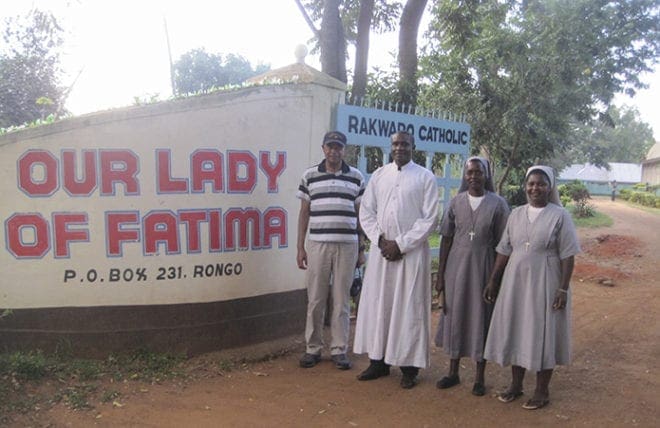
Deacon Frederick Toca of Most Blessed Sacrament Church in Atlanta, far left, poses with a priest and two sisters at Our Lady of Fatima School during his 2014 trip to Kenya. Deacon Toca is a Catholic Relief Services Global Fellow Ambassador.
It was Kat Doyle, director of Justice and Peace Ministries and Diocesan Director for CRS, who first pitched the idea to Trujillo.
“We want to do something of action at Eucharistic Congress,” Trujillo reported Doyle as saying. “How do we put our faith into action?” was the question posed.
“So over three years, we’ve packed 300,000 meals,” said Trujillo.
Archbishop Wilton D. Gregory, Bishop Joel Konzen, SM; and Bishop Ned Shlesigner attended the celebratory reception.
In remarks at the event, Bishop Konzen said that when there are pieces of our church story that we don’t know what to make of and may not engender pride, it is important to look at CRS.
“This piece of the story is one that I think we all say, ‘Wow, look at the work that is being done. I want to be a part of that.’”
The bishop is currently involved in supporting a Catholic home in Ghana for orphans, helping him notice what happens in the poorest places.
“And it makes me all the prouder of what goes on through CRS and how the average Catholic, anywhere can have a role in helping someone,” said Bishop Konzen. “After 75 years, CRS has certainly proven why it exists and what it does, and deserves our support.”
Kat Doyle showcased items related to CRS’ work from Share the Journey socks, to CRS Rice Bowls and ethical trade products.
She tasked those attending to be engaged.
“I want to challenge you to step up and try to be more supportive, find a way that you can get personally involved in one of the many things that CRS does, whether it’s using the Rice Bowl, praying the Advent prayers,” said Doyle. “The CRS website has amazing resources and great things you can do personally, with a ministry, you can do with your parish and you can do with your broader community.”
Only after joining CRS did Trujillo discover his family’s own connection to the agency.
Recently Trujillo learned that his parents and a maternal grandparent were assisted by CRS as Cuban refugees resettling in Miami, Florida in 1960.
The family’s story is chronicled in a special video tied to the celebration.
“I was definitely called by God to work here,” he said.
